-
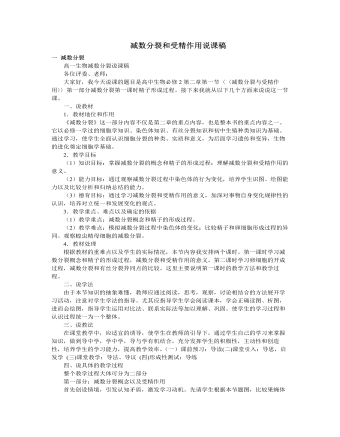
人教版高中生物必修2减数分裂和受精作用说课稿
一 减数分裂高一生物减数分裂说课稿各位评委、老师:大家好,我今天说课的题目是高中生物必修2第二章第一节〈〈减数分裂与受精作用〉〉第一部分减数分裂第一课时精子形成过程。接下来我就从以下几个方面来说说这一节课。一、说教材1.教材地位和作用《减数分裂》这一部分内容不仅是第二章的重点内容,也是整本书的重点内容之一。它以必修一学过的细胞学知识、染色体知识、有丝分裂知识和初中生殖种类知识为基础。通过学习,使学生全面认识细胞分裂的种类、实质和意义,为后面学习遗传和变异,生物的进化奠定细胞学基础。2.教学目标(1)知识目标:掌握减数分裂的概念和精子的形成过程;理解减数分裂和受精作用的意义。(2)能力目标:通过观察减数分裂过程中染色体的行为变化,培养学生识图、绘图能力以及比较分析和归纳总结的能力。

人教A版高中数学必修二简单随机抽样教学设计
知识探究(一):普查与抽查像人口普查这样,对每一个调查调查对象都进行调查的方法,称为全面调查(又称普查)。 在一个调查中,我们把调查对象的全体称为总体,组成总体的每一个调查对象称为个体。为了强调调查目的,也可以把调查对象的某些指标的全体作为总体,每一个调查对象的相应指标作为个体。问题二:除了普查,还有其他的调查方法吗?由于人口普查需要花费巨大的财力、物力,因而不宜经常进行。为了及时掌握全国人口变动状况,我国每年还会进行一次人口变动情况的调查,根据抽取的居民情况来推断总体的人口变动情况。像这样,根据一定目的,从总体中抽取一部分个体进行调查,并以此为依据对总体的情况作出估计和判断的方法,称为抽样调查(或称抽查)。我们把从总体中抽取的那部分个体称为样本,样本中包含的个体数称为样本量。

人教A版高中数学必修二复数的三角表示教学设计
本节内容是复数的三角表示,是复数与三角函数的结合,是对复数的拓展延伸,这样更有利于我们对复数的研究。1.数学抽象:利用复数的三角形式解决实际问题;2.逻辑推理:通过课堂探究逐步培养学生的逻辑思维能力;3.数学建模:掌握复数的三角形式;4.直观想象:利用复数三角形式解决一系列实际问题;5.数学运算:能够正确运用复数三角形式计算复数的乘法、除法;6.数据分析:通过经历提出问题—推导过程—得出结论—例题讲解—练习巩固的过程,让学生认识到数学知识的逻辑性和严密性。复数的三角形式、复数三角形式乘法、除法法则及其几何意义旧知导入:问题一:你还记得复数的几何意义吗?问题二:我们知道,向量也可以由它的大小和方向唯一确定,那么能否借助向量的大小和方向这两个要素来表示复数呢?如何表示?
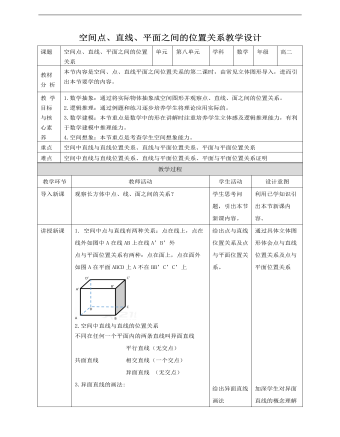
人教A版高中数学必修二空间点、直线、平面之间的位置关系教学设计
9.例二:如图,AB∩α=B,A?α, ?a.直线AB与a具有怎样的位置关系?为什么?解:直线AB与a是异面直线。理由如下:若直线AB与a不是异面直线,则它们相交或平行,设它们确定的平面为β,则B∈β, 由于经过点B与直线a有且仅有一个平面α,因此平面平面α与β重合,从而 , 进而A∈α,这与A?α矛盾。所以直线AB与a是异面直线。补充说明:例二告诉我们一种判断异面直线的方法:与一个平面相交的直线和这个平面内不经过交点的直线是异面直线。10. 例3 已知a,b,c是三条直线,如果a与b是异面直线,b与c是异面直线,那么a与c有怎样的位置关系?并画图说明.解: 直线a与直线c的位置关系可以是平行、相交、异面.如图(1)(2)(3).总结:判定两条直线是异面直线的方法(1)定义法:由定义判断两条直线不可能在同一平面内.
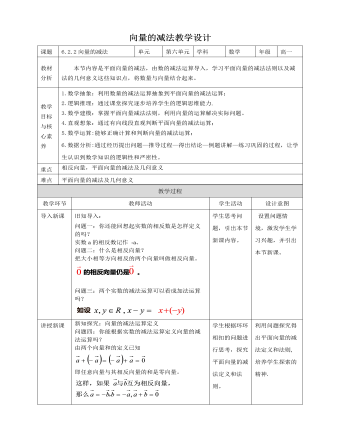
人教A版高中数学必修二向量的减法运算教学设计
新知探究:向量的减法运算定义问题四:你能根据实数的减法运算定义向量的减法运算吗?由两个向量和的定义已知 即任意向量与其相反向量的和是零向量。求两个向量差的运算叫做向量的减法。我们看到,向量的减法可以转化为向量的加法来进行:减去一个向量相当于加上这个向量的相反向量。即新知探究(二):向量减法的作图方法知识探究(三):向量减法的几何意义问题六:根据问题五,思考一下向量减法的几何意义是什么?问题七:非零共线向量怎样做减法运算? 问题八:非零共线向量怎样做减法运算?1.共线同向2.共线反向小试牛刀判一判(正确的打“√”,错误的打“×”)(1)两个向量的差仍是一个向量。 (√ )(2)向量的减法实质上是向量的加法的逆运算. ( √ )(3)向量a与向量b的差与向量b与向量a的差互为相反向量。 ( √ )(4)相反向量是共线向量。 ( √ )
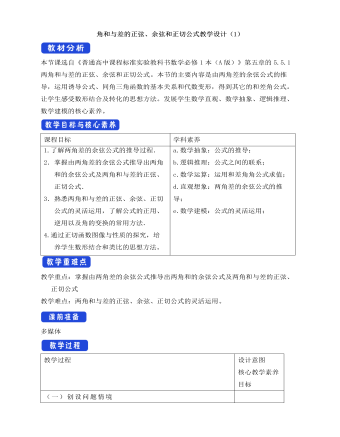
人教A版高中数学必修一两角和与差的正弦、余弦和正切公式教学设计(1)
本节课选自《普通高中课程标准实验教科书数学必修1本(A版)》第五章的5.5.1 两角和与差的正弦、余弦和正切公式。本节的主要内容是由两角差的余弦公式的推导,运用诱导公式、同角三角函数的基本关系和代数变形,得到其它的和差角公式。让学生感受数形结合及转化的思想方法。发展学生数学直观、数学抽象、逻辑推理、数学建模的核心素养。课程目标 学科素养1.了解两角差的余弦公式的推导过程.2.掌握由两角差的余弦公式推导出两角和的余弦公式及两角和与差的正弦、正切公式.3.熟悉两角和与差的正弦、余弦、正切公式的灵活运用,了解公式的正用、逆用以及角的变换的常用方法.4.通过正切函数图像与性质的探究,培养学生数形结合和类比的思想方法。 a.数学抽象:公式的推导;b.逻辑推理:公式之间的联系;c.数学运算:运用和差角角公式求值;d.直观想象:两角差的余弦公式的推导;e.数学建模:公式的灵活运用;
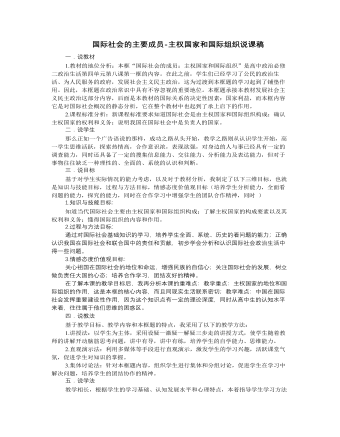
人教版高中政治必修2国际社会的主要成员-主权国家和国际组织说课稿
【教师总结:联合国的会徽的世界地图象征着联合国是一个世界性的国际组织;图案中得橄榄枝象征着和平。联合国采取了很多措施以实现它的宗旨,如对于朝鲜违反国际法规进行核试验,联合国给予警告和制裁,充分体现了它维护国际和平与安全,促进国际合作与发展的宗旨。】对于中国与联合国的关系这部分内容,我将请阅读教材92页几幅图片及材料内容,设置活动探究课中国在联合国的声音和身影,请合作讨论思考以下两个问题,中国与联合国的关系;列举事实说明中国在国际社会中的重要作用。 教师通过剖析中国在联合国的地位和作用,引导学生理解中国在国际社会中发挥着重要作用,是负责任的国家;同时培养学生综合运用知识分析说明问题的能力,使学生感受作为中国人的自豪。【教师总结:中国是联合国的创始国之一,中国作为联合国的创始国和安理会常任理事国之一,一贯遵循联合国宪章的宗旨和原则,积极参与联合国及其专门机构有利于世界和平和发展的活动。】
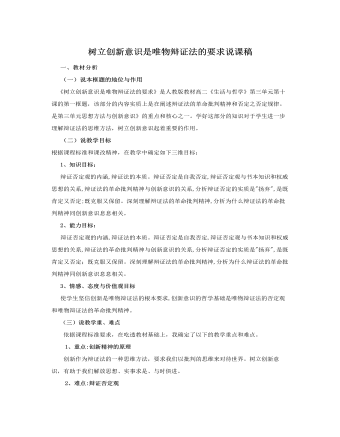
人教版高中政治必修4树立创新意识是唯物辩证法的要求说课稿(二)
一、教材分析(一)说本框题的地位与作用《树立创新意识是唯物辩证法的要求》是人教版教材高二《生活与哲学》第三单元第十课的第一框题,该部分的内容实质上是在阐述辩证法的革命批判精神和否定之否定规律。是第三单元思想方法与创新意识》的重点和核心之一。学好这部分的知识对于学生进一步理解辩证法的思维方法,树立创新意识起着重要的作用。(二)说教学目标根据课程标准和课改精神,在教学中确定如下三维目标:1、知识目标:辩证否定观的内涵,辩证法的本质。辩证否定是自我否定,辩证否定观与书本知识和权威思想的关系,辩证法的革命批判精神与创新意识的关系,分析辩证否定的实质是"扬弃",是既肯定又否定;既克服又保留。深刻理解辩证法的革命批判精神,分析为什么辩证法的革命批判精神同创新意识息息相关。
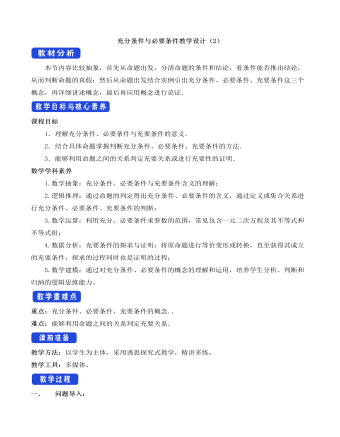
人教A版高中数学必修一充分条件与必要条件教学设计(2)
【例3】本例中“p是q的充分不必要条件”改为“p是q的必要不充分条件”,其他条件不变,试求m的取值范围.【答案】见解析【解析】由x2-8x-20≤0得-2≤x≤10,由x2-2x+1-m2≤0(m>0)得1-m≤x≤1+m(m>0)因为p是q的必要不充分条件,所以q?p,且p?/q.则{x|1-m≤x≤1+m,m>0}?{x|-2≤x≤10}所以m>01-m≥-21+m≤10,解得0<m≤3.即m的取值范围是(0,3].解题技巧:(利用充分、必要、充分必要条件的关系求参数范围)(1)化简p、q两命题,(2)根据p与q的关系(充分、必要、充要条件)转化为集合间的关系,(3)利用集合间的关系建立不等关系,(4)求解参数范围.跟踪训练三3.已知P={x|a-4<x<a+4},Q={x|1<x<3},“x∈P”是“x∈Q”的必要条件,求实数a的取值范围.【答案】见解析【解析】因为“x∈P”是x∈Q的必要条件,所以Q?P.所以a-4≤1a+4≥3解得-1≤a≤5即a的取值范围是[-1,5].五、课堂小结让学生总结本节课所学主要知识及解题技巧
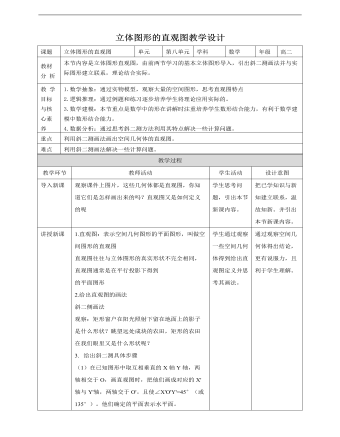
人教A版高中数学必修二立体图形直观图教学设计
1.直观图:表示空间几何图形的平面图形,叫做空间图形的直观图直观图往往与立体图形的真实形状不完全相同,直观图通常是在平行投影下得到的平面图形2.给出直观图的画法斜二侧画法观察:矩形窗户在阳光照射下留在地面上的影子是什么形状?眺望远处成块的农田,矩形的农田在我们眼里又是什么形状呢?3. 给出斜二测具体步骤(1)在已知图形中取互相垂直的X轴Y轴,两轴相交于O,画直观图时,把他们画成对应的X'轴与Y'轴,两轴交于O'。且使∠X'O'Y'=45°(或135°)。他们确定的平面表示水平面。(2)已知图形中平行于X轴或y轴的线段,在直观图中分别画成平行于X'轴或y'轴的线段。(3)已知图形中平行于X轴的线段,在直观图中保持原长度不变,平行于Y轴的线段,在直观图中长度为原来一半。4.对斜二测方法进行举例:对于平面多边形,我们常用斜二测画法画出他们的直观图。如图 A'B'C'D'就是利用斜二测画出的水平放置的正方形ABCD的直观图。其中横向线段A'B'=AB,C'D'=CD;纵向线段A'D'=1/2AD,B'C'=1/2BC;∠D'A'B'=45°,这与我们的直观观察是一致的。5.例一:用斜二测画法画水平放置的六边形的直观图(1)在六边形ABCDEF中,取AD所在直线为X轴,对称轴MN所在直线为Y轴,两轴交于O',使∠X'oy'=45°(2)以o'为中心,在X'上取A'D'=AD,在y'轴上取M'N'=½MN。以点N为中心,画B'C'平行于X'轴,并且等于BC;再以M'为中心,画E'F'平行于X‘轴并且等于EF。 (3)连接A'B',C'D',E'F',F'A',并擦去辅助线x轴y轴,便获得正六边形ABCDEF水平放置的直观图A'B'C'D'E'F' 6. 平面图形的斜二测画法(1)建两个坐标系,注意斜坐标系夹角为45°或135°;(2)与坐标轴平行或重合的线段保持平行或重合;(3)水平线段等长,竖直线段减半;(4)整理.简言之:“横不变,竖减半,平行、重合不改变。”
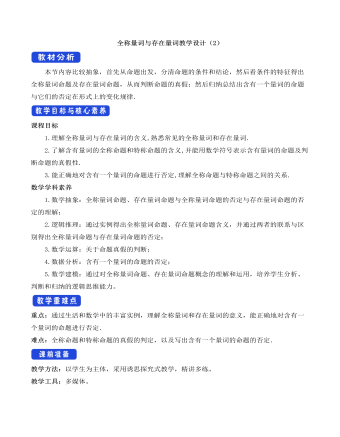
人教A版高中数学必修一全称量词与存在量词教学设计(2)
(4)“不论m取何实数,方程x2+2x-m=0都有实数根”是全称量词命题,其否定为“存在实数m0,使得方程x2+2x-m0=0没有实数根”,它是真命题.解题技巧:(含有一个量词的命题的否定方法)(1)一般地,写含有一个量词的命题的否定,首先要明确这个命题是全称量词命题还是存在量词命题,并找到其量词的位置及相应结论,然后把命题中的全称量词改成存在量词,存在量词改成全称量词,同时否定结论.(2)对于省略量词的命题,应先挖掘命题中隐含的量词,改写成含量词的完整形式,再依据规则来写出命题的否定.跟踪训练三3.写出下列命题的否定,并判断其真假:(1)p:?x∈R,x2-x+ ≥0;(2)q:所有的正方形都是矩形;(3)r:?x∈R,x2+3x+7≤0;(4)s:至少有一个实数x,使x3+1=0.【答案】见解析【解析】(1) p:?x∈R,x2-x+1/4<0.∵?x∈R,x2-x+1/4=(x"-" 1/2)^2≥0恒成立,∴ p是假命题.
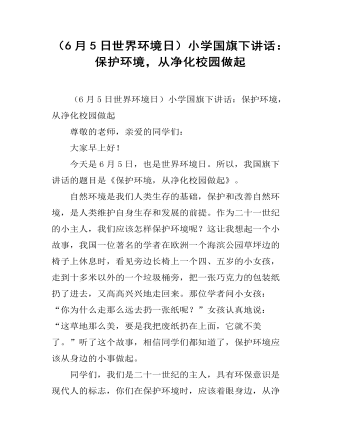
(6月5日世界环境日)小学国旗下讲话:保护环境,从净化校园做起
自然环境是我们人类生存的基础,保护和改善自然环境,是人类维护自身生存和发展的前提。作为二十一世纪的小主人,我们应该怎样保护环境呢?这让我想起一个小故事,我国一位著名的学者在欧洲一个海滨公园草坪边的椅子上休息时,看见旁边长椅上一个四、五岁的小女孩,走到十多米以外的一个垃圾桶旁,把一张巧克力的包装纸扔了进去,又高高兴兴地走回来。那位学者问小女孩:“你为什么走那么远去扔一张纸呢?”女孩认真地说:“这草地那么美,要是我把废纸扔在上面,它就不美了。”听了这个故事,相信同学们都知道了,保护环境应该从身边的小事做起。
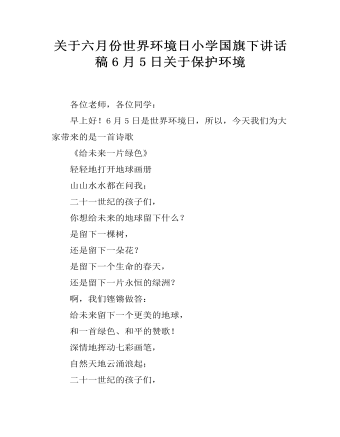
关于六月份世界环境日小学国旗下讲话稿6月5日关于保护环境
各位老师,各位同学:早上好!6月5日是世界环境日,所以,今天我们为大家带来的是一首诗歌《给未来一片绿色》轻轻地打开地球画册山山水水都在问我;二十一世纪的孩子们,你想给未来的地球留下什么?是留下一棵树,还是留下一朵花?是留下一个生命的春天,还是留下一片永恒的绿洲?啊,我们铿锵做答:给未来留下一个更美的地球,和一首绿色、和平的赞歌!深情地挥动七彩画笔,自然天地云涌浪起;二十一世纪的孩子们,
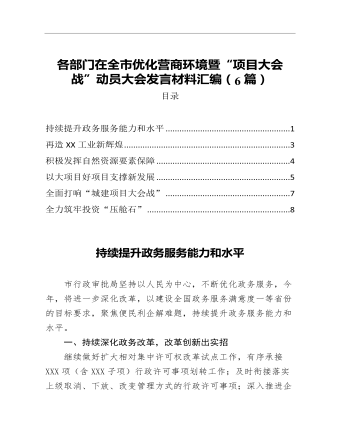
在全市优化营商环境暨项目大会战动员大会发言材料汇编6篇
一、持续深化政务改革,改革创新出实招继续做好扩大相对集中许可权改革试点工作,有序承接XXX项(含XXX子项)行政许可事项划转工作;及时衔接落实上级取消、下放、改变管理方式的行政许可事项;深入推进企业开办全程网办等商事领域改革,积极推进项目前期“一件事一次办”等投资项目领域改革,进一步优化流程,压缩审批时限,服务全市重大项目建设。

人教A版高中数学必修一两角和与差的正弦、余弦和正切公式教学设计(2)
本节内容是三角恒等变形的基础,是正弦线、余弦线和诱导公式等知识的延伸,同时,它又是两角和、差、倍、半角等公式的“源头”。两角和与差的正弦、余弦、正切是本章的重要内容,对于三角变换、三角恒等式的证明和三角函数式的化简、求值等三角问题的解决有着重要的支撑作用。 课程目标1、能够推导出两角和与差的正弦、余弦、正切公式并能应用; 2、掌握二倍角公式及变形公式,能灵活运用二倍角公式解决有关的化简、求值、证明问题.数学学科素养1.数学抽象:两角和与差的正弦、余弦和正切公式; 2.逻辑推理: 运用公式解决基本三角函数式的化简、证明等问题;3.数学运算:运用公式解决基本三角函数式求值问题.4.数学建模:学生体会到一般与特殊,换元等数学思想在三角恒等变换中的作用。.
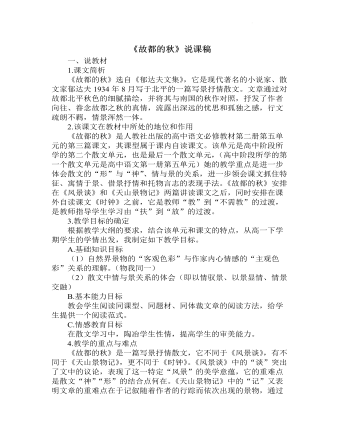
《故都的秋》说课稿(一) 2021-2022学年统编版高中语文必修上册
1.圈点、勾画重要词语评点的读书习惯和方法。如全出描绘秋色的词语,标出传递秋声的词语,点评北国故都秋色的词语、南国秋色的词语,摄取主要信息。2.口、耳、手、脑并用的读书习惯和方法。如默读、听读、跟读时,不动笔墨不看书,不动思维不读书。3.学以致用的迁移运用方法。如投影仪的练习设计,让学生由品文到品读诗词等。四、说教学程序(一)导语激趣人们常说,良好的开端是成功的一半,因而导语也就显得十分重要。好的导语能营造适宜的课堂氛围,集中学生的注意力,调动学生的学习情绪,使学生对学习的内容产生浓厚的兴趣。这篇课文的导语我是这样来设计的:同学们,自古诗家多爱秋,因为秋是文人心中的一粒愁种子。“无边落木萧萧下,不尽长江滚滚来。”这是杜甫面对秋风登高而抒怀;“梧桐更兼细雨,到黄昏,点点滴滴。这次第,怎一个愁字了得。”这是李清照面对秋雨而吟咏愁情。秋风秋雨愁煞人啦。
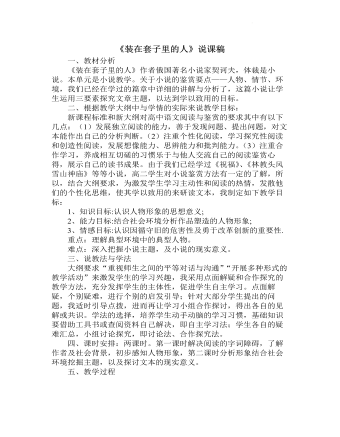
《装在套子里的人》说课稿 2021-2022学年统编版高中语文必修下册
8、板书装在套子里的人别里科夫的形象——有形的套子套己——无形的套子套人第二课时合作探究:目标挖掘主题及现实意义。问题设置,衔接上节课内容,层层深入。1、结合上节课别里科夫的形象分析:他的思想被什么套住,其悲剧原因在哪?(根据人物形象的分析与社会背景的了解,直击主题。)沙皇腐朽的专制统治套住了他的思想,沙皇的清规戒律使他不敢越雷池一步,所以他是受害者,但他的身份性格以及特定的社会环境,又让他成为沙皇统治的捍卫者。2、他恋爱的情节以及科瓦连科这两个人物的塑造的意义?(从人物以及主题入手,推翻沙皇的腐朽反动的统治,必须是每一个人都敢于打破套子,唤醒革新,更新观念,拒绝腐朽。)别里科夫渴望打破束缚,也想革新,而科瓦连科两个人物体现朝气活泼,以及勇于打破常规束缚的勇气,为革新升起了一片曙光。3、塑造别里科夫的手法,除了一般刻画人物方法外,还有什么方法?
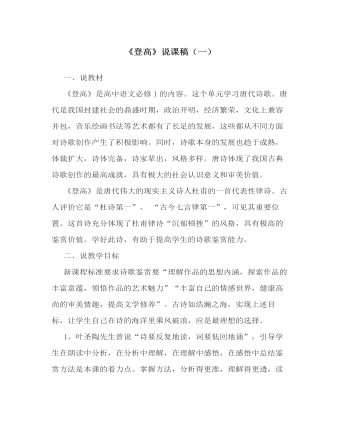
《登高》说课稿(一) 统编版高中语文必修上册
学生借助对对联的赏析,回味杜甫穷年漂泊的一生,体会杜甫作为一个深受儒家思想影响的读书人,忠君念阙,心系苍生的伟大情怀。(这一设计理念源于孟子所云:“诵其文,读其诗,不知其人,可乎?是以论其世也。”知人论世是鉴赏诗歌的第一步 )(二)研读课文1、初读,朗读吟诵,感知韵律美。要求学生读准字音,读懂句意,体会律诗的节奏、押韵的顺畅之美。2、再读,披词入情,感受感情美。让学生用一个字概括这首诗的情感内容。(此教学设计是从新课标要求的文学作品应先整体感知,培养学生归纳推理的逻辑思维能力出发进行的设计。)其答案是一个“悲”字,由此辐射出两个问题:诗人因何而“悲”?如何写“悲”?(此问题设计顺势而出,目的在于培养学生探究问题的能力。)
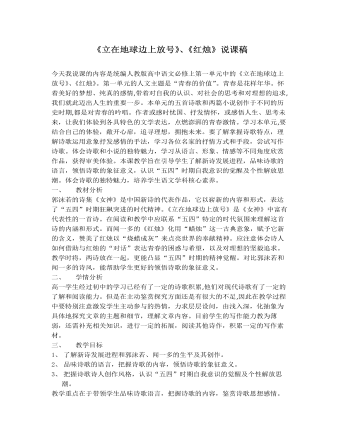
《立在地球边上放号》《红烛》说课稿 2021-2022学年统编版高中语文必修上册
四、 学法指导1、查阅资料,了解诗人写这首诗的处境,通过知人论世,理解诗歌。2、反复诵读,联系具体语境,品味诗歌的内涵,感受诗歌的意蕴。3、欣赏诗人相关的其他作品及名言,在理解、感受诗歌的基础上,领会诗人在诗歌中传达出来的精神,树立自我意识。五、教学过程环节一 常识补充1、文学革命:开始于1917年。它是晚清文学改良运动在新的历史条件下的发展,是适应以思想革命为主要内容的新文化运动而发生的。是新文化运动的一个组成部分,对封建思想的批判必然地转向对封建主义文学的攻击,反对文言,提倡白话,反对旧文学,是提倡新文学的一场文学革命运动。在中国文学史上竖起一个鲜明的界碑,标示着古典文学的结束,现代文学的起始。主要从诗歌、小说、戏剧、散文四个文学领域开展。2、① 现代诗歌:指“五四运动”至中华人民共和国成立以来的诗歌。中国近现代诗歌的主体新诗,诞生于“五四”新文化运动。
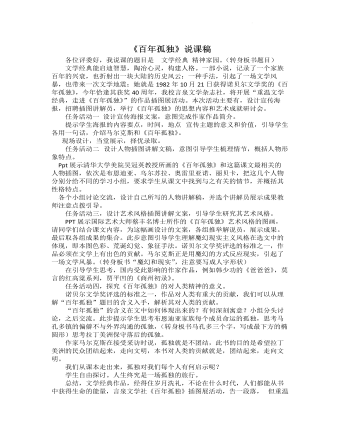
《百年孤独(节选)》说课稿 2022-2023学年统编版高中语文选择性必修上册
各位评委好,我说课的题目是 文学经典 精神家园。(转身板书题目)文学经典能启迪智慧,陶冶心灵,构建人格。一部小说,记录了一个家族百年的兴衰,也折射出一块大陆的历史风云;一种手法,引起了一场文学风暴,也带来一次文学地震;她就是1982年10月21日获得诺贝尔文学奖的《百年孤独》,今年恰逢其获奖40周年,我校言泉文学杂志社,将开展“重温文学经典,走进《百年孤独》”的作品插图展活动。本次活动主要有,设计宣传海报,招聘插图讲解员,举行《百年孤独》的思想内容和艺术成就研讨会。任务活动一 设计宣传海报文案,意图完成作家作品简介。提示学生海报的内容要点,时间,地点 宣传主题的意义和价值,引导学生各用一句话,介绍马尔克斯和《百年孤独》。现场设计,当堂展示,择优录取。任务活动二 设计人物插图讲解文稿,意图引导学生梳理情节,概括人物形象特点。

